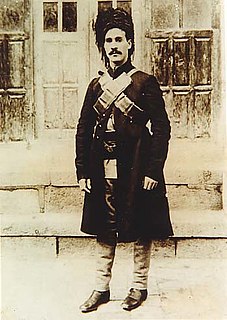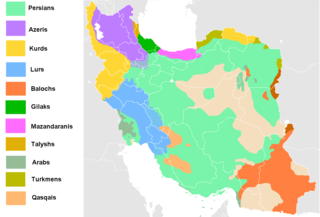Related Research Articles

Kurds or Kurdish people are an Iranic ethnic group native to a mountainous region of Western Asia known as Kurdistan, which spans southeastern Turkey, northwestern Iran, northern Iraq, and northern Syria. There are exclaves of Kurds in Central Anatolia, Khorasan, and the Caucasus, as well as significant Kurdish diaspora communities in the cities of western Turkey and Western Europe. The Kurdish population is estimated to be between 30 and 45 million.

The Kurds, are an Iranian ethnic group in the Middle East. They have historically inhabited the mountainous areas to the south of Lake Van and Lake Urmia, a geographical area collectively referred to as Kurdistan. Most Kurds speak Northern Kurdish (Kurmanji) or Sorani, which both belong to the Kurdish languages.

Mustafa Barzani also known as Mala Mustafa, was a Kurdish leader, and one of the most prominent political figures in modern Kurdish politics. In 1946, he was chosen as the leader of the Kurdistan Democratic Party (KDP) to lead the Kurdish revolution against Iraqi regimes, although at times he also allied himself to the Iranian government. Barzani was the primary political and military leader of the Kurdish revolution until his death in March 1979. He led campaigns of armed struggle against both the Iraqi and Iranian governments.

The Flag of Kurdistan was created by Xoybûn during the Ararat rebellion against Turkey in 1928, where it was hoisted by thousands of Kurdish rebels. The flag was subsequently presented to the European powers at the Versailles Peace Conference. When the Republic of Kurdistan in Iran was proclaimed in 1947, Mustafa Barzani hoisted the flag in Mahabad and the flag was adopted as the official flag of Kurdistan. Iraq's Kurdistan Region has since adopted the same flag as the official flag.

Mahabad, also Romanized as Mihābād and Muhābād, is a city and capital of Mahabad County, West Azerbaijan Province, Iran. At the 2006 census, its population was 168,000 in 31,000 families.

The Democratic Party of Iranian Kurdistan, also known as the Kurdish Democratic Party of Iran (KDPI), is an armed leftist ethnic party of Kurds in Iran, exiled in northern Iraq. It is banned in Iran and thus not able to operate openly.

Ardalan was a hereditary Kurdish vassaldom in western Iran until 1865 or 1868 with Sanandaj as capital. The territory corresponded roughly to present-day Kurdistan Province of Iran and the rulers were loyal to the Qajar Empire, while Baban was its main rival. Sunni islam was the official religion of the principality and Gorani its literary language and lingua franca. When the vassaldom fell, literary work in Gorani ceased.
Kurds in Iran are the third largest ethnic group in Iran after Persians and Iranian Azerbaijanis, comprising about 10% of the country's population according to the CIA in 2014.

Simko Shikak was a Kurdish chieftain of the Shakak tribe and nationalist. He was born into a prominent Kurdish feudal family based in Chihriq castle located near the Baranduz river in the Urmia region of northwestern Iran. By 1920, parts of Iranian Azerbaijan located west of Lake Urmia were under his control. He led Kurdish farmers into battle and defeated the Iranian army on several occasions. The Iranian government had him assassinated in 1930. Simko took part in the massacre of the Assyrians of Khoy and instigated the massacre of 1,000 Assyrians in Salmas.

Kurdish nationalism holds that the Kurdish people are deserving of a sovereign nation that would be partitioned out of areas in Turkey, northern Iraq, and Syria based on the promised nation of Kurdistan under the Treaty of Sèvres.

The Republic of Mahabad was a short-lived Kurdish self-governing unrecognized state in present-day Iran, from 22 January to 15 December 1946. The Republic of Mahabad arose alongside the Azerbaijan People's Government, a similarly short-lived state.

The Simko Shikak revolt refers to an armed Ottoman-backed tribal Kurdish uprising against the Qajar dynasty of Iran from 1918 to 1922, led by Kurdish chieftain Simko Shikak from the Shekak tribe. The revolt is often referred as the first modern conflict involving Iranian Kurds with separatist ambitions.

Kurdish separatism in Iran or the Kurdish–Iranian conflict is an ongoing, long running, separatist dispute between the Kurdish opposition in Western Iran and the governments of Iran, lasting since the emergence of Reza Shah Pahlavi in 1918.

The 1979 Kurdish rebellion in Iran erupted in mid-March 1979, some two months after the completion of the Iranian Revolution. It subsequently became the largest among the nationwide uprisings in Iran against the new state and one of the most intense Kurdish rebellions in modern Iran. Initially, Kurdish movements were trying to align with the new government of Iran, seeking to emphasize their Muslim identity and seek common ground with other Iranians. The KDPI even briefly branded itself as a non-separatist organization, allegedly criticizing those calling for independence, but nevertheless calling for political autonomy. However, relations between some Kurdish organizations and the Iranian government quickly deteriorated, and though Shi'a Kurds and some tribal leaders turned towards the new Shi'a Islamic State, Sunni Kurdish leftists continued the nationalist project in their enclave in Kurdistan Province.
Kurds in Iraq are people born in or residing in Iraq who are of Kurdish origin. The Kurds are the largest ethnic minority in Iraq, comprising between 15% and 20% of the country's population according to the CIA World Factbook.
The Hama Rashid revolt was a tribal uprising in Pahlavi Iran, during the Second World War, following the Anglo-Soviet invasion of Iran. The tribal revolt erupted in the general atmosphere of anarchy throughout Iran and its main faction was led by Muhammed Rashid, lasting from late 1941 until April 1942 and then re-erupted in 1944, resulting in Rashid's defeat.

West Azerbaijan Province is one of the 31 provinces of Iran. It is in the northwest of the country, bordering Turkey, Iraq and Azerbaijan's Nakhchivan Autonomous Republic, as well as the provinces of East Azerbaijan, Zanjan and Kurdistan. The province is part of Region 3. It is separated from Armenia by Turkey's short border with the Azerbaijan Republic. The province of West Azerbaijan covers an area of 39,487 km², or 43,660 km² including Lake Urmia. In 2012 the province had a population of about 3 million (estimate). The capital city and largest city of the province is Urmia.

Iranian Kurdistan is an unofficial name for the parts of northwestern Iran inhabited by Kurds which borders Iraq and Turkey. It includes the West Azerbaijan Province, Kurdistan Province, Kermanshah Province, Ilam Province and parts of Lorestan Province.

Kurdistan Region–Russia relations are bilateral relations between Kurdistan Region and Russia. While Kurdistan Region has a representation in Moscow, Russia has a consulate general in Erbil which opened on 28 November 2007. Relations between the Kurds and the Russians date back to the second half of the 1800s when Russian interest in Kurds because of expansionist ambitions. During the Cold War, the Soviet Union supported the Kurdish rebels against Iraq until the European power withdrew politically from the Middle East in the late 1970s because of the Middle-Eastern backlash from the Soviet invasion of Afghanistan.
References
- ↑ "KURDISH TRIBES – Encyclopaedia Iranica". www.iranicaonline.org. Retrieved 2019-10-20.
- ↑ Minorsky, V. (1957). "Mongol Place-Names in Mukri Kurdistan". Mongolica. 19 (1): 75. JSTOR 609632.
- ↑ Abdurrahman Sharafkandi. Çêştî Micêvir.
- 1 2 David McDowall (2004-05-14). A Modern History of the Kurds. I.B.Tauris. ISBN 978-1-85043-416-0.
- ↑ F. Koohi-Kamali (2003-09-30). The Political Development of the Kurds in Iran: Pastoral Nationalism. Palgrave Macmillan UK. ISBN 978-0-230-53572-5.
- ↑ Sykes, Mark (1908). "The Kurdish Tribes of the Ottoman Empire". The Journal of the Royal Anthropological Institute of Great Britain and Ireland. 38: 457. doi:10.2307/2843309. JSTOR 2843309.
- ↑ Stephanie Cronin (2007-01-24). Tribal Politics in Iran: Rural Conflict and the New State, 1921-1941. Routledge. pp. 116–. ISBN 978-1-134-13801-2.
- ↑ E. O'Ballance (1995-12-18). The Kurdish Struggle, 1920-94. Palgrave Macmillan UK. pp. 29–. ISBN 978-0-230-37742-4.